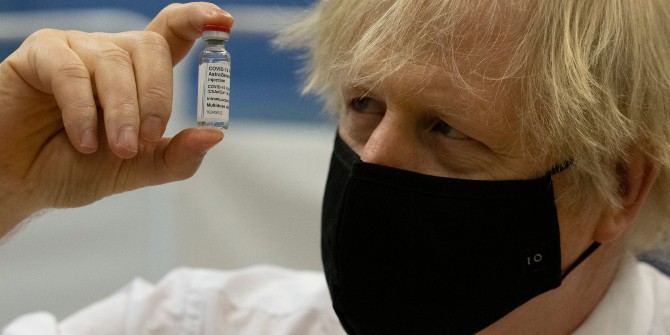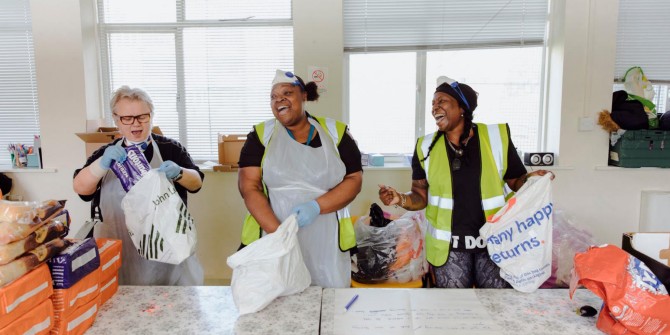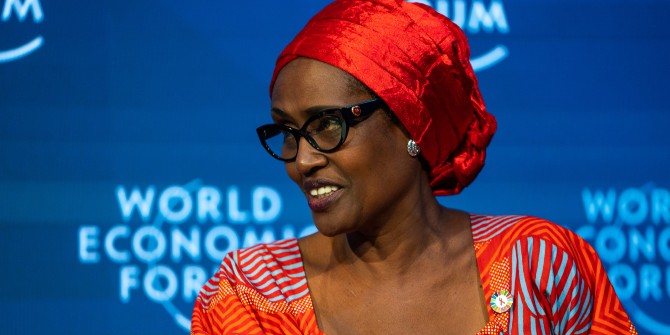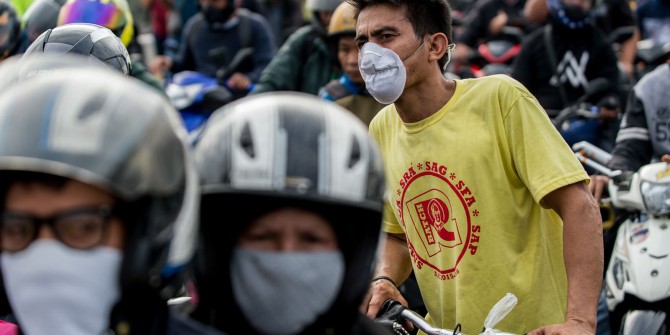Richer countries are vaccinating their own citizens first. But leaving the rest without access to jabs makes it more likely that new, possibly more dangerous, COVID-19 variants will spread, warn Rebecca Forman, Michael Anderson and Elias Mossialos (LSE). We urgently need a strategy to scale up vaccine supply.
Richer countries continue to fight amongst themselves over who gets limited vaccine resources, with little regard for the rest of the world. Most remain focused on vaccinating their own populations first. It could be argued that their older and more comorbid citizens are more vulnerable to poorer outcomes from COVID-19 infections. Some may claim that as these vaccines were predominantly developed in higher-income countries, they should be entitled to them first.
After poor planning and piecemeal, panicky decision-making, these nations are navigating vaccine supply shortages to try to get jabs for their populations as quickly as possible – often through knee-jerk reactions such as controls on exports.
The supply issues are significant, but they are much more acute in low- and middle-income countries (LMICs). Many richer nations have bought enough doses to vaccinate their entire populations several times over, while LMICs may not have enough vaccines to reach herd immunity in their populations until 2023 or 2024.
These supply issues were anticipated early on in the pandemic, but have still not been adequately addressed. The WHO COVID-19 Technology Access Pool (C-TAP) was established to pool COVID-19 health technology-related intellectual property and boost global vaccine production, but has still not received any contributions from technology holders. Partnerships between pharmaceutical companies to increase manufacturing capacity, such as between Pfizer and Sanofi, have been established but remain piecemeal and are not sufficient to meet global demand. CEPI, GAVI and the WHO have launched the Covax facility to aid the development, purchase, and delivery of COVID-19 vaccines in over 180 countries. Despite immense progress in securing agreements and substantial financial commitments from G7 member states recently, it is unlikely that Covax alone will help us reach the levels of immunity needed to end the pandemic any time soon.

If giving LMICs access to COVID vaccinations remains a second priority, there could be huge long-term consequences. An ICC Research Foundation-commissioned study reported that $1.2-9.2 trillion of global losses could accumulate if LMICs do not have adequate access to COVID vaccines. Up to $4.5 trillion of this could fall on developed countries. If the virus is left to spread and mutate unchecked, the impacts could be even worse. We now understand that some variants are less responsive to our current vaccines: the global damage that could result from lack of rapid and equitable access to vaccines in LMICs is, at this stage, unquantifiable. This short-termism could lead to prolonged efforts to combat the virus and the prospect of an endless cycle of revaccination to respond to new variants, which will be extremely costly in HICs and LMICs alike.
The pandemic has demonstrated how short-sighted, panicked and nationalistic decision-making is unsuccessful against a virus which does not respect national boundaries. We must learn from previous policy mistakes and consider the global implications that vaccine inequity will have, and we must scale up global vaccine production and manufacturing accordingly.
A joint taskforce of international players such as the WHO, the EU, the G20, and other interested parties should be established to rapidly develop strategies to boost global vaccine manufacturing. It could identify producers and mechanisms to facilitate technology transfer; and may also consider other ways to increase vaccine availability in LMICs, such as further funding for Covax, the relaxation of intellectual property rights, and country-to-country vaccine donations.
Many governments are under immense pressure from their own citizens to prioritise their immediate needs, so this will be politically challenging. However, exceptional pandemic circumstances call for exceptional co-operation – even amongst companies that usually compete with each other. Several pharmaceutical companies, including Sanofi and Novartis, have stepped up and announced plans to assist with production of COVID-19 vaccines in efforts to combat global shortages. Technology transfers like these should continue to be facilitated, as there is still enough under-utilised manufacturing capacity across the major pharmaceutical companies. Countries and global institutions should also reconsider ideas that were pitched earlier on in the pandemic, including patent pooling and patent purchasing, as mechanisms to boost vaccine production rates and improve global access.
This post represents the views of the authors and not those of the COVID-19 blog, nor LSE.






I challenge the entire premise of Me first being more dangerous.
The evolution of new and harsher variants of Covid-19 is primarily dependant on numbers not location. Where you vaccinate reduces the overall risk but does not eliminate it anywhere. Even if you vaccinate 96% of the population there is still a considerable risk.
If one nation refuses then we still all at risk. Thus it is wrong to imply 3rd world countries as more of a risk for worse variants – already belied by the UK strain.
Ultimately everyone needs to be vaccinated or there will be a cycle of new waves coming across borders and emerging internally.
If first world economies can revive earlier then the world can emerge earlier. If the first world sponsors the vaccines for the other economies then international trade will reopen and the epidemic has a plausible means to end.